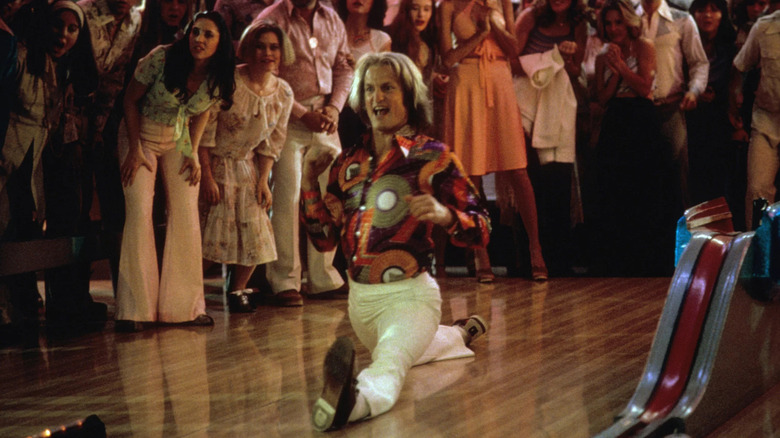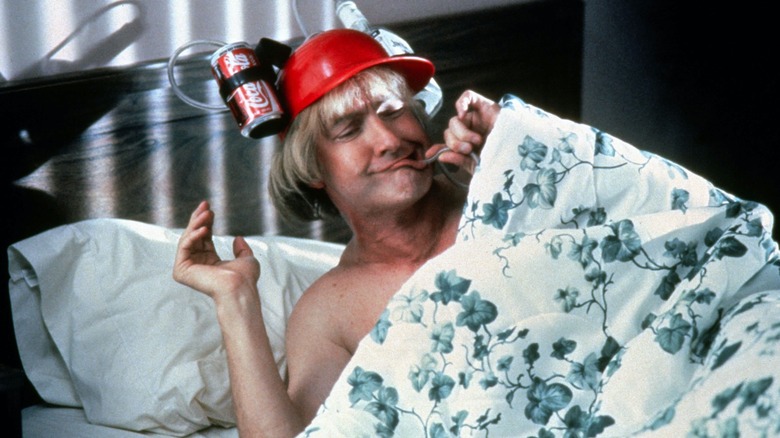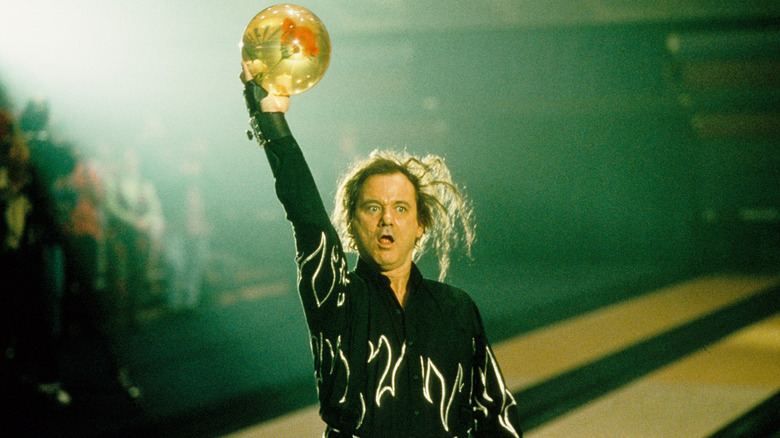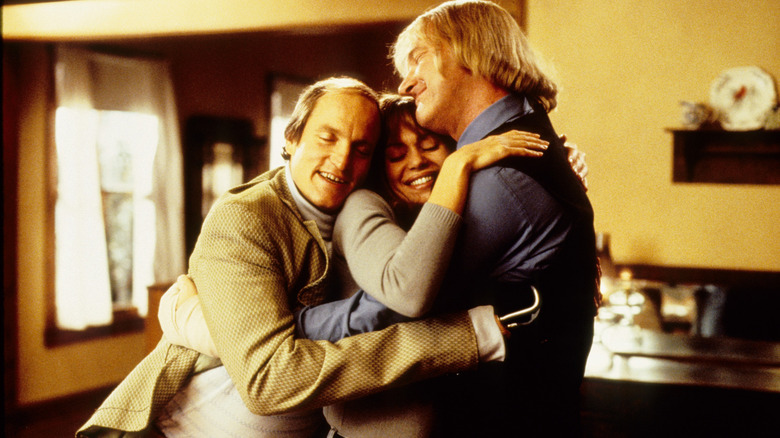Kingpin's Original Ending Could've Sent The Entire Movie Down The Gutter
Way back when Jeff Daniels had a volcanic case of diarrhoea in "Dumb and Dumber," who could have predicted that one of the directors would go on to helm a Best Picture Oscar winner? The Farrelly Brothers have come a long way since they first barfed their way onto the scene with their deliriously idiotic odyssey, with elder sibling Peter also picking up the Best Original Screenplay Oscar for "Green Book."
While they are at least semi-respectable now thanks to that big Oscar win, they will be forever known in many people's minds as the '90s kings of gross-out comedy, the natural heirs to "Animal House" and "Caddyshack," who paved the way for the likes of "American Pie," "Freddy Got Fingered," and more. When it comes to their infamous jokes, everyone has their lowlights; we can talk about selling a decapitated bird to a blind kid in "Dumb and Dumber," the excruciating scrotum/zipper interface in "There's Something About Mary," or Hank waterboarding a little girl in a fountain in "Me, Myself, and Irene."
Arriving between the unexpected box office smashes of "Dumb and Dumber" and "There's Something About Mary" came "Kingpin," a scuzzy, hilarious, and downbeat take on the classic sports movie formula. For all the tasteless gags about oral sex, semen, nipples, and prosthetic limbs, the film was steeped in a genuine sense of abject desperation and self-loathing for its main character, Roy Munson (Woody Harrelson), a washed-up former bowling champ who gets another shot at the big time by mentoring a promising up-and-comer. Despite beating "The Big Lebowski" to the title of best bowling movie ever by two years, critics hated "Kingpin" and the film was a box office flop. Yet it has endured as a cult classic, and Roy's journey concludes so satisfyingly compared to even the greatest hits in their potty-mouthed canon.
So what happens in Kingpin again?
Young bowling prodigy Roy Munson (Harrelson) has the world at his feet. It's 1979 and he's the toast of Ocelot, Iowa for winning the state championship, and now he's ready to go pro and take on the big boys. The tour starts with a bang, defeating the grossly conceited Ernie "Big Ern" McCracken (Bill Murray) to claim the prestigious Odor-Eaters Invitational top prize. McCracken doesn't exactly take the loss graciously, sabotaging Munson's car and setting the young contender up for a heavy fall, encouraging him to hustle some shady characters in a roughneck bowling alley. Not taking kindly to the con, they feed his bowling hand into the ball return, ending his career.
Flash forward 17 years later, Munson is an overweight, balding, alcoholic has-been with a dodgy rubber hand, living in a crummy neighborhood in Scranton, Pennsylvania. His job as a traveling bowling goods salesman just about keeps him in liquor, but he resorts to performing sexual favors for his vile, chain-smoking landlady in lieu of rent. Life is pretty bleak until he meets Ishmael Boorg (Randy Quaid), a naive Amish man with an intuitive flair for bowling. Munson tries to persuade the raw young talent to go pro with him as manager, but Ishmael isn't interested.
Munson spends some time hanging out in the Amish community, building barns and milking bulls, until he finally tempts Ishmael with the $1 million prize in a winner-takes-all competition in Reno, Nevada. It turns out that Ishmael's family is in debt and are in danger of losing their farm to the bank, giving us a classic setup for a road trip. Along the way, they pick up Claudia (Vanessa Angel), the trophy girlfriend of a sinister millionaire, and their paths inevitably cross with McCracken, who is now a major bowling celebrity. When Ishmael busts his hand, Roy is forced to play against his nemesis again...
Is Kingpin the best Farrelly Brothers movie?
Although I have a soft spot for "Dumb and Dumber" in particular, I think you can make a strong case for "Kingpin" being the Farrellys' best movie. They really nail the tawdry environment of low-level competitive bowling, where everything is a little garish but still looks like it smells of cigarettes and stale beer. There is none of the nostalgic gloss that the Coens' give the sport in their magical slow-mo sequences in "The Big Lebowski," making Roy and Big Ern's world look very sad and pathetic indeed. That depressing grittiness has helped it age better than the two big hits that came out either side of it, which both look like very '90s artifacts in comparison.
That may make it sound like a bummer, but "Kingpin" is just as funny as anything else they've done, if not more so. The humor has aged better, too, although some jokes cause a wince in our more PC-conscious times. Since it's the Farrelly Brothers, there are plenty of obscene, off-the-cuff gags, but the comedy is generally in service of a better storyline which pays off in unexpected ways.
The trio of Harrelson, Quaid, and Murray are superb, with the latter giving one of his most irresistibly loathsome performances as Big Ern. Before he became the sad, deadpan elder statesman of indie movies, Murray was always at his best playing a bit of an a**hole. McCracken is so monstrously egotistical and unapologetically awful, and Murray is so clearly in his element, that he smashes every scene he's in. He gets an able assist from his wild combover that gets more aggressively out of control as the movie goes on.
The Farrellys delight in upsetting sports movie tropes and conventions, denying the audience a cathartic triumph for Munson over McCracken. If any sports movie rival deserves to have his face rubbed in humiliating defeat, it is Big Ern. Munson suffers the sting of defeat, but the Brothers have a less cliched redemptive arc for him, one that ultimately makes more sense for the character. But it could have been much different...
The Farrelly Brothers changed the ending of Kingpin...
In a 20th anniversary oral history of "Kingpin," the Farrelly Brothers revealed that the original ending was much different from the one we know today. In the first screenplay, Munson loses the big cash prize to McCracken, but then he goes into a casino, puts a quarter in a machine, and wins a million dollars that way instead. No wonder they wanted to change it. Peter Farrelly said:
"It was too easy. We knew the audience was thinking he's gonna win the big thing, and we didn't want that to happen. We wanted him to lose. It wasn't about the victory in a bowling tournament, it was a bigger thing."
Brother Bobby Farrelly added:
"We saw it as more of a redemption story where Roy Munson didn't have to win the bowling tournament. That would've been too predictable. So we tweaked it so it was more about Roy winning back his own self-esteem, that was the victory he got."
It was a good decision, far more in keeping with Munson's narrative and the overall tone of the film. Letting him walk away a millionaire would have just cheapened the whole thing. It's like the conclusion of "Dumb and Dumber;" if the Farrellys had given Harry and Lloyd the reward of becoming oil boys for a busload of bikini-clad women, it would have undermined the film's commitment to the duo's unshakable status as losers. Munson might have had talent, but he only ever had a small-time mindset, screwing up his career by allowing himself to get led astray and making some small-time decisions.
Let McCracken have a gaudy amount of money to buy his way out of anything... that's his style. Munson learns and grows over the course of the film and is rewarded in less materialistic ways. He kicks the booze and turns his disability to an advantage, using his exposure as the "Rubber Man" to land a sponsorship deal with a condom company. He still gets to help Ishmael's family out and ride off into the sunset with his new love at his side. Friendship, love, and self-respect... that's better than a million bucks, right?



